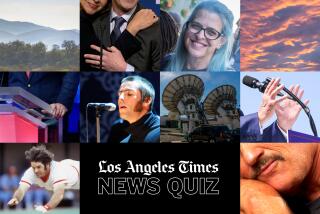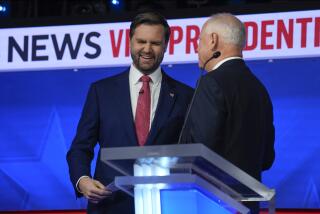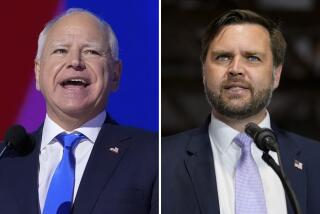Blogosphere moderates the moderator
- Share via
ORANGEBURG, S.C. — There were five hours to go before the first debate of the 2008 presidential campaign season, and the campus of South Carolina State University was buzzing with activity. The marching band performed a rousing concert as young activists jostled before the cameras with a thicket of signs bearing messages like “Clinton Country.”
But the mood was hushed inside a wood-paneled room in the college’s administration building, where NBC anchor Brian Williams huddled with producers, reviewing the questions he would pose to the eight Democratic candidates that evening.
The anchor popped an Excedrin as he scanned the pages marked up with blue ink, his leg bouncing rapidly under the table. This would be the third moderation of a presidential debate for Williams, a political junkie who can quote passages of the Almanac of American Politics almost verbatim. But he seemed uncharacteristically apprehensive as he contemplated the task ahead.
“I’m not wild about the potential exposure,” said Williams, already clad in the dark blue suit and violet tie he would wear onstage. “People shoot the messenger these days.”
Thursday’s debate, which aired on MSNBC and local NBC affiliates in South Carolina, kicked off a jam-packed year of televised candidate forums that will probably test the media that conduct them as much as the contenders themselves.
With robust online communities on the left and the right poised to pounce on any signs of bias, major news organizations face aggressive challenging of their fairness like never before.
“There’s a lot of pushback,” said Democratic strategist Bill Carrick. “We always had the conservative talk show clamor that the mainstream media is liberal. This is beyond that.”
He continued: “There’s just a higher level of scrutiny.,”
Earlier this year, CBS anchor Katie Couric was bombarded with criticism after she pressed former Sen. John Edwards (D-N.C.) about why he decided to stay in the race after his wife’s cancer returned. Liberal activists raised such a ruckus about Fox News moderating Democratic debates -- they said the channel had a conservative bias -- that one scheduled for August in Nevada was canceled.
To Williams, the stepped-up focus can be healthy.
“It makes you incredibly careful,” the 47-year-old anchor said.
Still, going into Thursday’s debate, he aimed to block out the inevitable second-guessing that would follow.
“You stay in a protective shell and not think about it,” he said.
For the NBC anchor, who is in a race of his own with ABC’s Charles Gibson, the stakes are especially high.
After succeeding Tom Brokaw in December 2004, Williams enjoyed a ratings honeymoon for a time, easily besting his rivals at ABC and CBS. But in recent months, Gibson’s broadcast has caught up with NBC. Lately the two have been neck and neck in the weekly ratings competition, although NBC maintains a slight edge in audience for the season, with an average of 9.1 million viewers to ABC’s 8.8 million.
Williams maintains that he’s sanguine about Gibson’s gains, saying, “I don’t view it as a judgment on the content of our newscast.
“A back-and-forth ratings lead in the evening news business in 2007 is a great story, and it makes me very happy that so much attention is being focused on what we do,” he added.
Landing the first debate of the 2008 political season was a coup for NBC News, whose cable network MSNBC is hoping to rise from third place by making politics its brand this season.
On Thursday, 2.26 million viewers tuned in to the debate, giving MSNBC its biggest audience for the time period since the Iraq war launched in March 2003.
Next week, the cable channel is hosting the first Republican debate, to be moderated by Chris Matthews.
Tammy Haddad, MSNBC’s vice president in charge of political coverage, said the competition among the networks to host this year’s debates was the fiercest she had ever seen: “Careers are made and advanced for both talent and politicians in these debates, and it’s always an opportunity for a network to advance itself.”
But network producers are acutely aware of the challenges of pulling off a successful event in such a politicized environment. “In this culture, there’s scrutiny on all of us,” said Chuck Todd, NBC’s political director. “There will be bloggers dedicated to attacking the security guy who handles the auditorium.”
Phil Alongi, executive producer of the network’s special events, said NBC’s political team spent two months brainstorming topics for the debate and trying to anticipate potential minefields. The night before the event, he stayed up until 4 a.m. reviewing questions.
The intense spotlight “is a good thing, quite frankly,” he said. “It made us focus on our questions so they were very pointed and very direct.”
But an atmosphere of tension hung over the NBC team for most of Thursday afternoon.
At 6:24 p.m., Williams stepped onto a riser outside the auditorium to anchor the first 15 minutes of “NBC Nightly News” -- a duty that would leave him perilously little time to get in position for the 7 p.m. debate.
“This is the easy part,” Williams murmured to producers in the control room as he secured his earpiece. “To be honest, I can’t wait to break off and go.”
Soon enough, the anchor was onstage and barreling through 90 minutes of lively give-and-take. Afterward, beaming producers surrounded Williams, pounding him on the back with congratulations.
“I think it was good, I guess,” the anchor said. “But it goes by like a freight train -- I have no perspective.”
The blogosphere reviews were mixed. “Debate winner: Brian Williams,” declared one writer in Missouri, whereas posters on many liberal sites argued that his questions resembled Republican talking points.
Offered one observer on Daily Kos: “Kudos to Williams. The purple tie? Genius.”
On Friday, the amused anchor said he hadn’t even noticed that he had chosen a color that signaled neutrality between the red and blue states.
“That is proof that there is such a thing as too much scrutiny,” Williams said, adding wryly: “That I didn’t wear French cuffs no one should take as anti-French sentiment on my part.”
More to Read
Get the L.A. Times Politics newsletter
Deeply reported insights into legislation, politics and policy from Sacramento, Washington and beyond. In your inbox three times per week.
You may occasionally receive promotional content from the Los Angeles Times.










